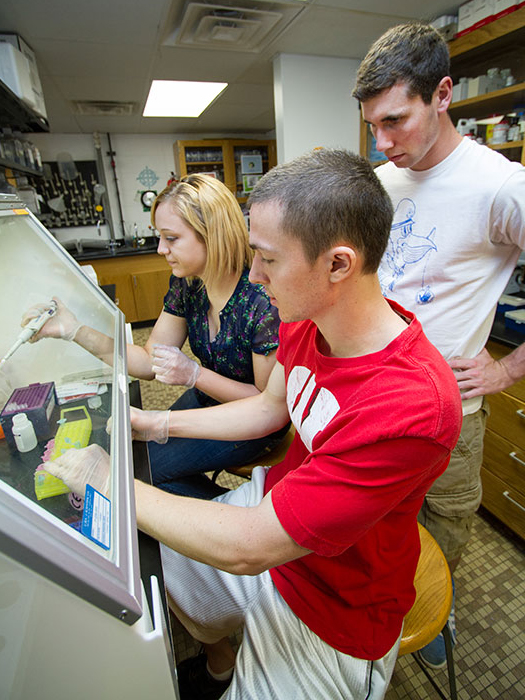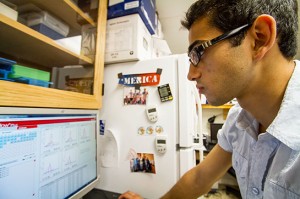Posted 9:36 p.m. Wednesday, July 3, 2013

Summer is a great time to be a scientist. Learn why.
 From left, Megan Mikkelson, sophomore at Texas A&M; Shawn Sells, UW-L senior; and James Saxton, Drake University sophomore. The three are processing samples in Scott Cooper's science lab.[/caption]
Summer is a great time to be a scientist.
In UW-L Biology Professor Scott Cooper’s lab, students can spend four to five hour stints on research without the interruption of class schedules and homework.
Cooper has 12 students in his lab this summer. Four are Central High School graduates who now attend schools other than UW-La Crosse.
“My policy is, if a student asks to do research, I don’t say ‘no,’’’ says Cooper.
During the academic year, he attracts anywhere from 20 to 30 student researchers. At times he’s even had students from local high schools participate.
James Saxton, a pre-medical student at Drake University, is volunteering in the lab this summer. He values an experience where he can look inside living organisms and understand how they work.
Cooper’s students are working to understand how ground squirrels prevent their blood from clotting when their heart rate slows down during hibernation. Cooper’s research could potentially lend insight into a major health issue in America. About 40 percent of all deaths in America are due to a blood clot in the heart. Answers about how squirrels prevent clotting could lead to treatments for humans — specifically how to help prevent heart attacks or treat bleeding disorders and heart disease.
[caption id="attachment_24590" align="alignright" width="300"]
From left, Megan Mikkelson, sophomore at Texas A&M; Shawn Sells, UW-L senior; and James Saxton, Drake University sophomore. The three are processing samples in Scott Cooper's science lab.[/caption]
Summer is a great time to be a scientist.
In UW-L Biology Professor Scott Cooper’s lab, students can spend four to five hour stints on research without the interruption of class schedules and homework.
Cooper has 12 students in his lab this summer. Four are Central High School graduates who now attend schools other than UW-La Crosse.
“My policy is, if a student asks to do research, I don’t say ‘no,’’’ says Cooper.
During the academic year, he attracts anywhere from 20 to 30 student researchers. At times he’s even had students from local high schools participate.
James Saxton, a pre-medical student at Drake University, is volunteering in the lab this summer. He values an experience where he can look inside living organisms and understand how they work.
Cooper’s students are working to understand how ground squirrels prevent their blood from clotting when their heart rate slows down during hibernation. Cooper’s research could potentially lend insight into a major health issue in America. About 40 percent of all deaths in America are due to a blood clot in the heart. Answers about how squirrels prevent clotting could lead to treatments for humans — specifically how to help prevent heart attacks or treat bleeding disorders and heart disease.
[caption id="attachment_24590" align="alignright" width="300"] Alli Jandal is a sophomore at Drake University. Home for the summer, he learned about Scott Cooper's research and was immediately interested in helping out.[/caption]
“I didn’t realize how much good research I could be involved in with applications to medicine and treatment,” says Alli Jandal, a Drake University sophomore and Central High School graduate.
Such experience makes the idea of doing scientific research less intimidating and helps students learn to think critically, adds Jandal.
Megan Mikkelson, a sophomore at Texas A&M, and UW-L student Shawn Sells say hands-on lab experience is a must. Mikkelson says she is required to log research hours for her major in genetics.
“This is a completely new experience,” says Mikkelson. “I’m learning a lot about cell biology that I didn’t learn in the classroom.”
Sells, who receives a Dean’s Distinguished Fellowship grant to work with Cooper this summer, adds that the research goes beyond academics. “It’s job experience for the future,” he says.
Cooper’s research is funded by a $303,700 grant from The National Institutes of Health.
Alli Jandal is a sophomore at Drake University. Home for the summer, he learned about Scott Cooper's research and was immediately interested in helping out.[/caption]
“I didn’t realize how much good research I could be involved in with applications to medicine and treatment,” says Alli Jandal, a Drake University sophomore and Central High School graduate.
Such experience makes the idea of doing scientific research less intimidating and helps students learn to think critically, adds Jandal.
Megan Mikkelson, a sophomore at Texas A&M, and UW-L student Shawn Sells say hands-on lab experience is a must. Mikkelson says she is required to log research hours for her major in genetics.
“This is a completely new experience,” says Mikkelson. “I’m learning a lot about cell biology that I didn’t learn in the classroom.”
Sells, who receives a Dean’s Distinguished Fellowship grant to work with Cooper this summer, adds that the research goes beyond academics. “It’s job experience for the future,” he says.
Cooper’s research is funded by a $303,700 grant from The National Institutes of Health.